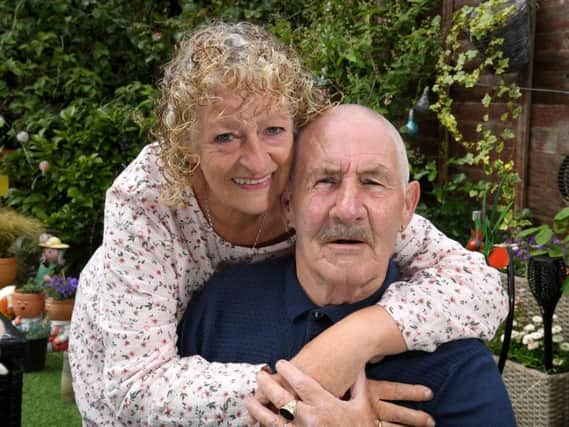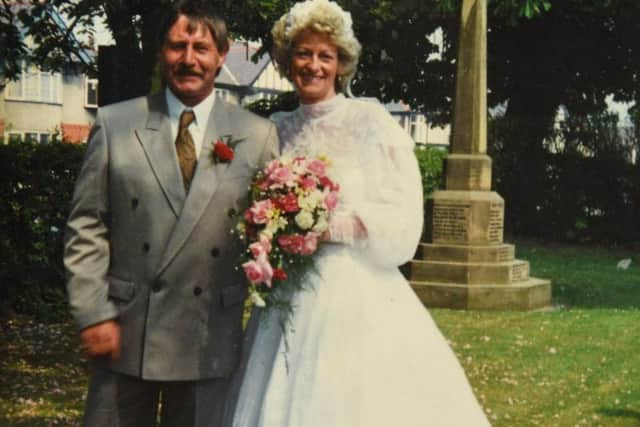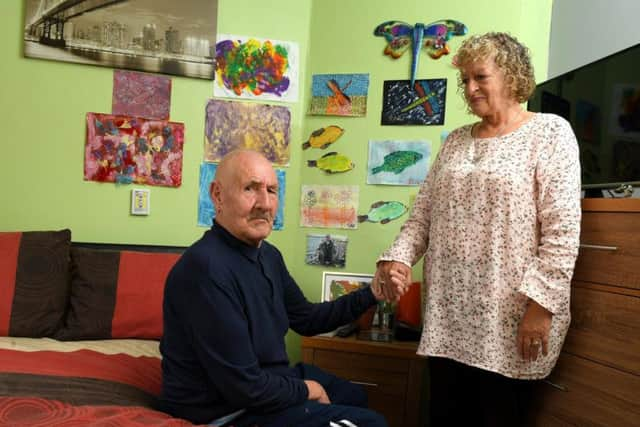'Dementia has taken away my husband and I feel I've lost half of me too' - Preston woman reveals struggles of everyday life with the condition


Barry and Norma Kirby from Ribbleton, should be living out their retirement dream of travelling the country in a camper van, exploring fishing sites.
But now 64-year-old Norma faces a daily challenge of looking after her husband who has vascular dementia.
Advertisement
Hide AdAdvertisement
Hide AdSuch is the severity of his illness that Norma is required to watch him around the clock, helping him roll cigarettes, make cups of tea and make sure he doesn’t injure himself.


She has been forced to give up her job of 20-years as a machinist at Tetrad to care for the man she met as a teenager and married twice, and the only respite she receives is when Barry goes to an Age Concern day care centre three times a week.
But despite the hardship, Norma describes their relationship as “a fairytale” - having met when she was 17, married at 18, and despite a divorce and six years apart, remarrying in 1990.
On December 3, 2010, Barry, now 71, had an operation on his neck after suffering a series of mini strokes.
Advertisement
Hide AdAdvertisement
Hide AdHe’d noticed his legs keep giving way, but didn’t know at that time it was a symptom of the strokes.


Norma said: “He used to work on the water mains and he’d never know what time he was getting home, so he never made any appointments. The first thing I made him do when he was made redundant, was to go to the doctors.
“They did an X-Ray and found wear and tear on his hips and high blood pressure, but then he also started to lose his sight for a few seconds at a time.
“One day I got home from work and he said he’d been told he had to go to the hospital straight away.”
Advertisement
Hide AdAdvertisement
Hide AdBarry was kept in at the hospital and had a procedure to clean out the arteries in his neck.
But things took a tragic turn for the worse when he suffered a major stroke on the operating table and ended up in Intensive Care, after which he developed a problem with his left eye, which was drooping.
He has been left totally blind in his left eye, and half blind in his right eye due to the stroke.
Norma said: “He couldn’t walk, use his right arm or talk.
“When I got him home I bought baby books and I had to teach him colours and shapes.”
Advertisement
Hide AdAdvertisement
Hide AdAfter re-learning how to walk and talk, Norma noticed Barry starting to shuffle when he walked, and took him to the doctors for further tests.
He was diagnosed with vascular dementia three years ago at the memory assessment unit at Charnley Fold in Bamber Bridge.
Norma said: “At the time I didn’t know anything about it (dementia). At one point I could leave him for a few hours, but not now.
“It’s worse than having a baby. It’s the repetitive stuff - he’s obsessed with cigarettes.
Advertisement
Hide AdAdvertisement
Hide Ad“I can be sat making a cigarette and he’s asking for another. He’s fixated on them. He can be out the front having one, then he’ll come to the back and have another straightaway. He was always a heavy smoker, but not like that. I don’t think he can remember when he’s had one.
“I’m not that good at rolling cigarettes, so I can spend two to three hours a day rolling them, making sure he’s got enough. If it wasn’t for the cigarettes, my life wouldn’t be half as bad, but then maybe he’d be fixated on something else.”
Norma’s had to remove the gas fire from their home in Whitmore Place, as it is unsafe for Barry to be near, as well as closing cupboard doors he’s opened and checking he hasn’t put rubbish in the recycling, which she was once warned about by Preston Council.
She said: “He knows two names - of one them mine unfortunately! I must hear ‘Norma!” 50 times a day. The other is our grandson Junior.
Advertisement
Hide AdAdvertisement
Hide Ad“I can be in the shower and he’s shouting Norma, Norma! I can’t go to the toilet in peace, but when I come down, it’s all something and nothing, it’ll be about a spoon for his cup.”
“I used to have a skincare routine with cleanser and moisturiser, but not anymore. It’s difficult finding time to go to the hairdressers.
“You do not have a routine, every day is different. When he’s not in daycare, they’re the worst days. I can’t sit down because he’s constantly shouting for me.
“He’s obsessed with toilet rolls and tissues as well. And because he’s had a Turkish shave in the past, every time we drive passed one now, he starts pointing them out and rubbing his face.”
“I’m knackered, mentally and physically.”
Advertisement
Hide AdAdvertisement
Hide AdShe added: “It’s amazing how many friends you lose. People don’t know what to say, so they don’t come.
“It’s just when you need people the most.
“He’s half the man he was, and I feel as if I’m exactly the same. I feel I’ve lost half of me too. It’s hard to explain, but when paperwork for something comes through the door, then I don’t have the time or the energy to look at it.
“I used to love going to the bingo, but now that’s stopped. You have no social life whatsoever.
I used to go to see my family in Newcastle every bank holiday, now we don’t do that.
Advertisement
Hide AdAdvertisement
Hide Ad“He’s alright at home, he can make his own brew and get up the stairs himself, but he wouldn’t be able to do that in Newcastle.”
After speaking to staff at the memory clinic in Charnley Fold, Bamber Bridge, Norma found out about Age Concern’s Withy Trees Day Centre for people with dementia in Brackenbury Road, Preston.
Barry now attends on Mondays, Wednesdays and Fridays, taking part in activities such as painting, dominoes, and listening to music.
Music, it seems, brings part of the ‘old’ Barry back for Norma.
Advertisement
Hide AdAdvertisement
Hide AdWhen staff played Ringo Starr’s You’re 16, You’re Beautiful (And You’re Mine) - a song Barry and Norma used to sing together when they first met, Barry sang every word while looking into his wife’s eyes.
At a recent reopening of the centre following extensive refurbishment, he was encouraged to take the microphone.
Norma said: “When he was singing and dancing on the karaoke, it got me upset. It was like he used to be.”
What is dementia?
Dementia is caused by a number of diseases that affect the brain. The most common is Alzheimer’s but diseases also include vascular dementia, dementia with Lewy bodies and Pick’s disease.
Advertisement
Hide AdAdvertisement
Hide AdDementia damages the nerve cells in the brain so messages can’t be sent from and to the brain effectively, which prevents the body from functioning normally.
Symptoms include memory loss and difficulties with thinking, problem-solving or language. These changes are often small to start with, but for someone with dementia they have become severe enough to affect daily life. A person with dementia may also experience changes in their mood or behaviour.
Physical symptoms can include difficulties using a TV remote control, phone or kitchen appliance, becoming unsteady on their feet, pins and needles in the feet and needing help with daily activities like dressing, eating and using the toilet.
Dementia friends
The Lancashire Post is calling on our readers to become Dementia Friends.
Advertisement
Hide AdAdvertisement
Hide AdThe initiative, run by the Alzheimer’s Society, is aimed at changing people’s perceptions of dementia.
Being a Dementia Friend simply means learning more about dementia, putting yourself in the shoes of someone living with the condition, and turning you understanding into action. From visiting someone you know with dementia to being more patient in a shop queue.
You can also sign up to become a Dementia Friends Champions. These are people who are trained volunteers who encourage others to learn a little bit about dementia. Champions run information sessions in their community and inspire others to help those living with dementia live well.
Find out more at: www.dementiafriends.org.uk